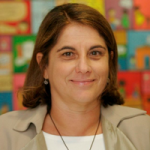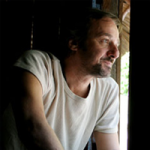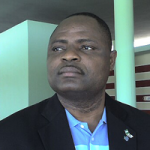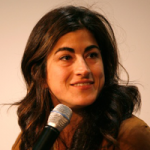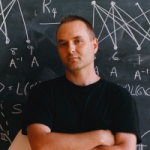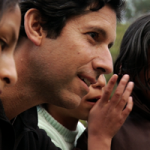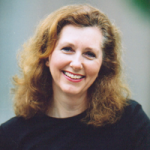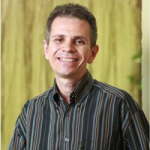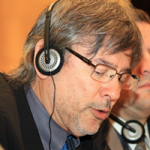Ashoka describes social entrepreneurs as, “individuals with innovative solutions to society’s most pressing social problems. They are ambitious and persistent, tackling major social issues and offering new ideas for wide-scale change. Rather than leaving societal needs to the government or business sectors, social entrepreneurs find what is not working and solve the problem by changing the system, spreading the solution, and persuading entire societies to take new leaps. Social entrepreneurs often seem to be possessed by their ideas, committing their lives to changing the direction of their field. They are both visionaries and ultimate realists, concerned with the practical implementation of their vision above all else.”
The Social Entrepreneurs
- Bill Drayton
- Muhammad Yunus
- Premal Shah
- Karen Tse
- Wellington Nogueira, Brazil
- Bart Weetjens, Tanzania
- Dener Giovanini
- Al Etmanski
- Vera Cordeiro, Brazil
- Eugênio Scannavino Netto, Brazil
- Isaac Durojaiya, Nigeria
- Jehane Noujaim, USA
- John Mighton, Canada
- Joaquin Leguia, Peru
- Mary Gordon, Canada
- Joaquim Melo, Brazil
- Oscar Rivas, Paraguay
- Rodrigo Baggio, Brazil
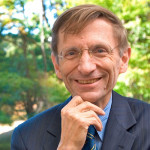
Bill Drayton
Bill Drayton
Ashoka
USA
Bill Drayton pioneered the field of social entrepreneurship. After graduating from Harvard, he went on to study at Balliol College in Oxford University, followed by Yale Law School. As a student, he was active in civil rights and founded a number of organizations ranging from Yale Legislative Services to Harvard’s Ashoka Table, an interdisciplinary weekly forum in the social sciences. He started his professional career as a management consultant with McKinsey and Company in New York, then served as an assistant administrator at the U.S. Environmental Protection Agency where he launched emissions trading (the basis of Kyoto) among other reforms. After his term at the EPA ended in 1981, he returned to McKinsey half-time and launched both Ashoka and Save EPA and its successor, Environmental Safety.
After receiving a MacArthur Fellowship in 1984, he was able to devote himself fully to Ashoka. Today, Ashoka supports thousands of social leaders in more than 80 countries, which are defined as “social entrepreneurs” – entrepreneurs with innovative solutions to society’s most pressing problems. This group of entrepreneurs are heavily engaged and very persistent, facing major social issues and offering new ideas for wide-scale change. In addition to his current role as Chairman and CEO of Ashoka, Drayton is the chair of Youth Venture, Community Greens, and Get America Working!
About Ashoka
Ashoka is the largest network of social entrepreneurs worldwide, with nearly 3,000 Ashoka Fellows in 70 countries putting their system changing ideas into practice on a global scale. Founded in 1980, Ashoka has provided start-up financing, professional support services, and connections to a global network across the business and social sectors, and a platform for people dedicated to changing the world. Ashoka launched the field of social entrepreneurship and has activated multi-sector partners across the world who increasingly look to entrepreneurial talent and new ideas to solve social problems.
Quote from Who Cares?
“You can’t think of a major problem the world has that doesn’t need the solution to at least be partially global. You can’t solve the environment problem in one country. We cannot build a safe financial system in one country, or even the rich countries alone. It won’t work.” – “What is the force that has the greatest power in the world? And it’s pretty obvious, it’s a big pattern change idea, but only if it’s in the hands of a really good entrepreneur. It’s that combination that moves the world.”
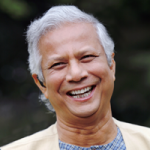
Muhammad Yunus
Muhammad Yunus
Grameen Bank – Yunus Centre
Bangladesh
Muhammad Yunus is considered to be the mastermind of microcredit. As a professor in Bangladesh in the 1970s, after having graduated with a PhD in Economics, Yunus noted local people getting poorer and poorer and living with many loan sharks that in practice, took control of the lives of these people. Yunus decided to do something about it and Grameen was born about 30 years ago. Initially, Yunus lent US$ 27 of his own money to people in need – the overwhelming majority: women. Banks couldn’t anticipate lending money to poor people who had no proof of income. So he offered to be the guarantor. To date, the loans Grameen Bank issues are based solely on trust – and not in contracts or legal arrangements. Winner of the 2006 Nobel Peace Prize, Yunus continues to inspire citizens around the globe, especially through his most recent efforts to champion the cause for social business. Yunus is recognized as an Ashoka changemaker, among many other prestigious titles and accolades for his impressive career.
About Grameen Bank
The Grameen family of organizations has grown beyond Grameen Bank into a multi-faceted group of profitable and non-profit ventures. Most of these organizations have central offices at the Grameen Bank Complex in Bangladesh. The Grameen Bank started to diversify in the late 1980s when it started attending to unutilized or underutilized fishing ponds, as well as irrigation pumps like deep tubewells. In 1989, these diversified interests started growing into separate organizations, as the fisheries project became Grameen Fisheries Foundation and the irrigation project became Grameen Krishi Foundation. These ventures include Social Advancement Fund (SAF), Grameen Trust, Grameen Fund, Grameen Communications, among many others.
Quote from Who Cares?
“I think poverty can be eliminated from the whole world, because poverty doesn’t belong to human society. Poverty is artificially imposed on human beings, is not natural to them, it’s not part of human being. So, something artificial can always be pulled off.”

Premal Shah
Premal Shah
Kiva
USA
Premal Shah first began dreaming of “internet microfinance” while working at PayPal, the online payments company. In late 2004, Premal took a 3 month leave from PayPal to develop and test the internet microfinance concept in India. When he returned to Silicon Valley, he met other like-minded dreamers and quit his job at PayPal to help bring the Kiva concept to life and eventually to scale. Starting with the online lending platform in 2005, Kiva is now creating a new way for lenders of average means – primarily those living in more developed economies – to loan to poor, small-scale entrepreneurs living in less developed parts of the world. The online experience feels real and direct: it establishes a connection through the stories of real people and through continuously updated information on recent transactions – new lenders joining, loans getting repaid, loan requests getting funded, and so forth.
About Kiva
Kiva is an online microcredit system that overcame two primary hurdles: the prevailing investment structure for microfinance institutions did that do not offer an entry point for lenders who wanted to loan small amounts; and a lack of existing platform that enabled person-to-person partnership and inspired personal connections and accountability. Through volunteers and partners, Kiva (meaning “agreement”, “unity” in Swahili) connects people with the aim of minimizing poverty through microfinance to small entrepreneurs. Starting with the online lending platform in 2005, Kiva is now creating a new way for lenders of average means – primarily those living in more developed economies – to loan to poor, small-scale entrepreneurs living in less developed parts of the world. The online experience feels real and direct: it establishes a connection through the stories of real people and through continuously updated information on recent transactions – new lenders joining, loans getting repaid, loan requests getting funded, and so forth. Through the site, lenders feel a collaborative spirit both with the entrepreneur and with other lenders who pay into a loan amount. The lending experience offers a first exposure to microfinance for many who visit the site, deepening awareness of global economic inequity, and of the shared opportunity to build an enabling environment for entrepreneurship. The NGO has grossed nearly $ 283 million in loans (usually multiples of $ 25), and the repayment rate is 98.88%.
Quote from Who Cares?
“We don’t want to show the poor as helpless people who need your help. We want to show the poor as people who have their own ideas of how they can actually get themselves out of poverty and they want to be treated as a business partner with you. They want you to be their investor, their lender and they’ll pay you back. And it’s a relationship based on mutual dignity.”
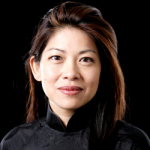
Karen Tse
Karen Tse
International Bridges to Justice
Switzerland
Karen Tse, an international human rights lawyer, Unitarian Universalist minister and former San Francisco public defender, Karen first developed her interest in the cross section of criminal law and human rights in 1986, after observing Southeast Asian refugees detained in a local prison without trial. In 1994, she moved to Cambodia to train the country’s first core group of public defenders and subsequently served as a United Nations Judicial Mentor. Under the auspices of the U.N., she trained judges and prosecutors, and established the first arraignment court in Cambodia. In 2000, Karen formed IBJ after witnessing hundreds of prisoners of all ages being held without trials, usually after being tortured into making ‘confessions’, in order to promote systemic global change in the administration of criminal justice. In the initial stages, she negotiated groundbreaking measures in judicial reform with the Chinese, Vietnamese and Cambodian governments and then expanded IBJ’s programming to include Rwanda, Burundi and India. IBJ has created a Global Defense Support Program to bring IBJ assistance to public defenders worldwide. Currently, IBJ has a presence in thirty-one countries. Karen’s work has awarded her many honors, including that of an Ashoka fellow.
About International Bridges to Justice
International Bridges to Justice’s mission is, in line with the fundamental principles of the Universal Declaration of Human Rights, to protect the basic legal rights of ordinary citizens in developing countries. This means providing competent legal representation, a fair trial and the right to be free from torture. IBJ’s vision is straightforward: a global movement to improve criminal defense systems, particularly in terms of due process and the rights of the accused. IBJ works with governments, not against them. IBJ opens relationships by working intensively within the system, but understands that long-term support must be a citizen-led effort, rather than the programmatic specialty of her organization alone. The organization’s goal is to build the bridge, ensure its strength, and direct international traffic to flow through it. IBJ currently has access to 8,000 defenders in Cambodia, China, and Vietnam, who serve over 1.3 billion people.
Quote from Who Cares?
“I think a social entrepreneur is someone who sees hope sometimes where other people see no hope, sees possibilities where there are no possibilities. And is able to look at the spaces in between. They’re visionary in many ways, they have imagination, they have hope, but infinitely practical. Practical and detail oriented in a very strange, strange way.”

Wellington Nogueira, Brazil
Wellington Nogueira
Doutores da Alegria
Brazil
Wellington Nogueira was part of American clown Michael Christensen’s troupe (director of the Big Apple Circus) which, in 1986, initiated a working group called “Clown Car Unit” to bring joy to children admitted to hospitals in New York. In 1991, returning to Brazil, Wellington founded the organization Doctors of Joy to bring happiness into the lives of children in hospitals through the dramatic art of clowning. Early on in his career as a clown, Wellington discovered that for Doctors of Joy to truly take hold, he would have to prove that his clown troupes in hospitals were more than simply a sporadic diversion for the children and could indeed be a key factor in their care. He devised a model with hospital administration and staff where the Doctors of Joy would be a stable, frequent presence, coming two to three times per week at regular times to meet individually with the children. Now, in the hospitals where they work, the clowns have become an integral part of the health care team. Wellington is an Ashoka fellow.
About Doutores de Alegria (Doctors of Joy)
Doctors of Joy, uses clowns to work with hospitalized children, their families, and with doctors and nurses throughout the city of São Paulo, to alleviate some of the children’s suffering and to bring a humanizing element into hospital care. The clowns challenge children and parents to look at illnesses from a brighter perspective and gain a better understanding of their bodies, while bringing humor and joy into the care equation. The “Doctors” have conducted more than 800,000 visits to hospitalized children in São Paulo, Recife and Belo Horizonte, always with the aim of promoting the experience of joy as a potentiator of healthy relations between clowns, hospitalized children, their parents and health professionals. Currently, the group operates in 19 hospitals in four Brazilian states.
Quote from Who Cares?
“What can a company learn from an NGO? What can an NGO learn from a company? Could there be convergence in this process and thereby the creation of a new model of management, a new model for a company that is born socially responsible and that is only successful because everyone around it is also successful?”
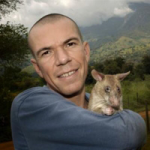
Bart Weetjens, Tanzania
Bart Weetjens
APOPO
Tanzania
As a boy, Bart Weetjens loved all kinds of rodents. He kept them as pets and bred them to earn extra spending money. It was early 1990s and the landmine issue was being addressed in the media. While searching for an alternative detector, Bart remembered his youth pets with their logistic conveniences and easy trainability. His proposals to investigate using trained rats as landmine detectors were laughed at for a few years; but with persistence, he secured a research grant from the Belgian Government in 1997 and APOPO was launched. Since then, Bart and his colleagues developed and deployed the HeroRATS’ technology to become Africa’s preferred landmine countermeasure technology in 2006. The rats are able to sniff and find out where there are landmines freeing up huge areas of land previously destroyed by wars. Bart is also training rats to detect turbeculosis in samples of human saliva in a way that is even faster and more efficient than conventional laboratories. Overall, APOPO’s mission is to develop detection rats technology to provide solutions for global problems and inspire positive social change. Bart is an Ashoka fellow.
About APOPO
APOPO is a social enterprise that researches, develops and implements detection rats technology for humanitarian purposes such as Mine Action and Tuberculosis detection. APOPO is a Belgian NGO, with headquarters in Tanzania and operations in Mozambique, Thailand, Angola and Cambodia.
Quote from Who Cares?
“All social entrepreneurs, if you ask them, at some point in their life – at least all that I’ve met till now – at some point in their lives they got confronted with injustice, with poverty, name it, with an imbalance in society. Because of this contrast experience, people, actually, do start being engaged for a specific goal.”
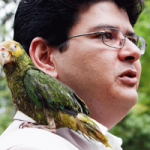
Dener Giovanini
Dener Giovanini
Renctas
Brazil
Dener Giovanini is an internationally recognized environmentalist. Throughout his youth, Dener was deeply involved as a leader in student politics and science fairs, and early on displayed a tendency toward concern for the environment. At 19, he was one of the founders of the Green Party in Brazil. After four years, he left to focus on environmental activism. After attending the Rio de Janeiro Earth Summit in 1992, Dener founded the Sociedade Mata Viva (The Living Forest Society), which today has grown to serve forty municipalities, finding solutions to environmental and social issues. One of the many projects he designed and implemented was called Uma Rua, Um Pomar (One Street, One Orchard). Dener mobilized about 3,000 residents to plant 1,500 fruit trees in their neighborhood, a low-income area of Tres Rios. The follow-up included classes on how to harvest, preserve and cook with fruit, thus offering nutritional alternatives for families who had formerly survived off of garbage. Packaging and marketing the fruit jams became a source of income for the families. Mata Viva is the parent organization of RENCTAS. Dener is an Ashoka fellow.
Dener has received the UNEP-Sasakaw (the most important and prestigious environmental award of the planet, presented by the UN in 2003); he was listed one of the 54 environmental heroes of the planet (Courrier International Magazine in 2006); and received the status of “Social Entrepreneur Noteworthy” by Ashoka, Avina Foundation and Schwab.
About Renctas
The National Network Combatting Wild Animal Trafficking (A Rede Nacional de Combate ao Tráfico de Animais Silvestres), or RENCTAS, is a citizen-based network to fight the third largest illegal business in the world, animal trafficking. RENCTAS incorporates Internet communications into a start-to-finish system that saves animals’ lives, brings criminals to justice, and provides new employment opportunities to rural traffickers.
Quote from Who Cares?
“Anybody can be a Social Entrepreneur. It’s not some divine blessing. You don’t take a pill to become a social entrepreneur. You simply become aware of your own power of transformation.”
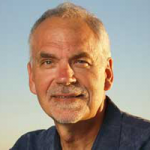
Al Etmanski
Al Etmanski
Planned Lifetime Advocacy Network (PLAN)
Canada
In the mid 80s, Al Etmanski began to hear questions and think about what would be of disabled children after their parents death. Many countries guarantee human rights for this population but that, alone, was too little, especially in Canada. He wanted this group of people to have meaningful and interesting lives. Increasingly, disabled people are living longer and their longevity means that many will outlive their parents. Al set out to address a concern that a mounting number of parents of disabled persons live with: “What will happen to my son or daughter when I die?” He redirects that question to “What does it take to make a life–however long–a good life?” He decided to offer a new way of thinking about disabilities and citizenship and new insight about how to remove the barriers to a good life. In 1989, with a small and dedicated group of like-minded people, Al co-founded PLAN.
In addition, Al has written two best-selling books: A Good Life and Safe and Secure. He is a founding member of the J.W. McConnell Family Foundation’s Social Innovation Generation (SIG) collaboration. Elected as a global Ashoka Fellow in 2003, Al also holds a faculty position at John McKnight’s Asset Based Community Development Institute. He has received the Queen’s Jubilee Medal, Simon Fraser University’s Distinguished Leadership Award, the City of Vancouver Civic Merit Award and the Governor General’s Meritorious Service Medal.
About Plan
The mission of Planned Lifetime Advocacy Network (PLAN) is to help families secure the future of their relatives with disabilities and promote their health and mental well-being. For PLAN, everyone should have a good life, which means having friends and family who love them, their own space to inhabit, financial security, participation in decisions and ability to contribute to society. At the heart of this work is the construction of networks of affection between individuals with special needs, social contribution of these people which results in citizenship, financial self-sufficiency and total commitment of the family in the program.
PLAN helps to develop personal networks and provide advice, assistance and advocacy on government benefits, home ownership, and legal and financial solutions for persons with disabilities. Since inception, PLAN has successfully initiated the world’s first Registered Disability Savings Plan to benefit 500,000 individuals with disabilities, and the organization has mentored over 40 similar organizations worldwide.
Quote from Who Cares?
“Change-making will not work in isolation from government and it will not work in isolation from the corporate world. And so there is hope in the world if we create a generation of changemakers who see the good everywhere in society, who tap into that, who marshal that, who mobilize that, as a force for change regardless of where it exists.”
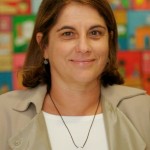
Vera Cordeiro
Vera Cordeiro
Saúde Criança
Brazil
Vera Gaensly Cordeiro is a pediatrician from Rio de Janeiro who could not stand to see terribly or terminally ill children obtain treatment in her hospital only to be released to such poverty that they could not recover or have any hope of comfort. As a doctor in one of the city’s largest government hospitals, Vera experienced the misery-illness-hospital-misery-death cycle that condemns so many poor children time after time. She also learned how limited human and material resources available to break this cycle were. She found that implementing small and subtle changes and providing critical support to children’s families could offer an escape from this cycle of misery. For example, she observed that children were returning to the hospital because they lacked vital necessities: shelter, post-operative treatment, and nutritious food. By making it possible for them to obtain these necessities, they could escape the cycle of return and decline. In 1991, Vera and a volunteer coalition of professionals including doctors and nurses, psychologists, lawyers, and homemakers set up Associação Saúde Criança. Vera is an Ashoka fellow.
About Saúde Criança
Saúde Criança has implemented a holistic, multidimensional approach to healthcare in five critical areas: health, education, citizenship, income generation and housing. The non-profit – a volunteer, membership network of committed individuals – provides patients’ families with the support they need in order to create the best environment for discharged children, who are either convalescing from an acute illness or have a terminal illness but are receiving outpatient care. The non-profit devises alternative systems of aftercare; provides free professional and other services; and leads fundraising efforts. Because Saude Criança´s methodology has proven to be so effective at tackling the roots of disease, it has been replicated in 23 other health institutions throughout Brazil. It has also become public policy in Belo Horizonte, the third largest city in Brazil.
Quote from Who Cares?
“When an ordinary citizen says, ‘Enough! I don’t want to live on this planet!’ And this ‘enough’ is not: Enough and I’ll have to live with, it’s: ‘Enough, I’m going to start something’. It doesn’t matter whether he can help four people or a thousand. What’s important is the feeling of wanting to do something.”
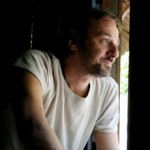
Eugênio Scannavino Netto
Eugênio Scannavino Netto
Saúde e Alegria
Brazil
Physician Eugênio Scannavino Netto opted for the language of the people to convey his “Health and Happiness” project to some of the poorest of Brazil’s poor, the neglected people of the Amazon. Early in his practice in tropical medicine, as a rural physician, Eugênio saw that treating the ill in a clinic only fed a disease-oriented view of medicine and health. Among the very poor backwoods residents of the Amazon, preventive health care includes showing them in simple terms ways to use the most available resources to enhance health. Some plants and animals in the rainforest environment offer the very elements humans need for health. Some conditions can be easily cured through inexpensive home remedies. In both cases, health and sometimes life itself can depend on knowing what to do and how to use everyday elements in the environment. Eugênio is an Ashoka fellow.
About Saúde e Alegria (Health and Happiness)
Eugênio Scannavino Netto designed his “Health and Happiness” circus to bring to poor Amazon residents, spending a few days in each area. During the periodic visits, the multidisciplinary team performs circus and theater acts and puppet shows using popular characters to entertain and educate at the same time. Games help teach nutrition to children. The team gives mini-courses about health issues in which the residents themselves have expressed an interest. The team’s work reinforces the idea that people live healthier, happier lives when they live in tune with the natural environment and emphasizes the forest as a health resource.
Quote from Who Cares?
“Who is the government? It is a group that stays there for 4, 8 years? We entrepreneurs are there in the “Health and Happiness”. I’ve been in this region already for 20 years. Lots of councilmen and mayors passed by. But who is there every day? The “Health and Happiness” people and the communities. Who is there every day with the community? The NGOs, the entrepreneurs who have been there for years and years, learning every day. The private companies that are creating jobs.”
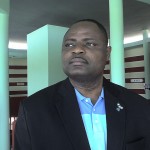
Isaac Durojaiya
Isaac Durojaiya
DMT Mobile Toilets
Nigeria
Isaac Durojaiye (aka Otunba Gadaffi) believed that the health and dignity of Nigerian citizens was eroded by the lack of adequate toilet facilities which forced many people to defecate and urinate in public in major cities around the country. For Isaac the solution was simple: Nigerian cities could be as clean and hygienic as any other city if adequate facilities were provided. Based on this recognition, starting in Lagos, Isaac embarked on the first mobile toilet initiative in the country.
Sadly, Isaac died in 2012 but his company, DMT Mobile Toilets, lives on. His work is especially memorialized through his Ashoka fellowship, as he is highlighted in Rippling, a book by Beverly Schwartz.
About DMT Mobile Toilets
DMT Toilets manufactures mobile toilets locally and in a manner that meets the needs of the different categories of users. For instance, squatting mobile toilets are built for markets, parks and streets, while executive toilets are manufactured for use at seminars, crusades, construction sites, and parties. In addition, all the toilets are leased to unemployed youth who make fixed returns at the end of the day and keep whatever they make over the fixed amount. In this way, Isaac Durojaiye not only helped in creating a healthier more dignified environment throughout Nigeria, but created hundreds of jobs in the process.
Quote from Who Cares?
“Bringing the spirit of Richard Branson, the man who loves to make money on one hand and bring the spirit of Mother Teresa, a human who wants to give back to the society. Bring the two of them together, there you have a social entrepreneur.”

Jehane Noujaim
Jehane Noujaim
Pangea Day
USA
Jehane Noujaim is not only a provocative, successful, young documentary producer and filmmaker; she is an international activist who believes passionately in the power of film to help move people toward global acceptance of diversity. Egyptian American filmmaker Jehane has worked on various documentaries in both the Middle East and the United States. Before graduating from Harvard, she was awarded the Gardiner Fellowship for Mokattam, an Arabic film she directed about a garbage-collecting village near Cairo, Egypt. Jehane then joined the MTV News and Documentary Division as a segment producer for the documentary series Unfiltered. She soon left her position at MTV to produce and direct the feature documentary StartUp.com. The critically acclaimed film won countless awards including the DGA and IDA awards for best documentary.
Jehane has continued to work in the US and in the Middle East as an executive producer for such films as Encounter Point and Budrus. She has also co-directed (with Sherief El Katsha) Egypt: We Are Watching You, which premiered as one of the ten films in the Why Democracy series focusing on contemporary democracy around the globe. Jehane has recently worked on two films, Engineer Rafea and The Square. Filmed in India and Jordan, Engineer Rafea follows women who leave their villages to be trained for six months in India as solar engineers. When these women return home, they solar power their communities. The second film, The Square, follows the uprising in Tahrir Square, Cairo, Egypt, which inspired the country and the entire world.
About Pangea Day
In 2006, Jehane Noujaim was the youngest person and first woman to win the coveted TED prize, a prize which grants winners a wish to change the world. Jehane’s wish was to create a day in which the power of film could bring people from all over the world together to form a global community and allows them to gain a new understanding of each other. This day, called Pangea Day, consisted of a live videoconference featuring music, film, and speakers in cities around the world, including Cairo, New York City, and Rio de Janeiro. One of the partners, a hardware company, sent equipment to schools and programs in conflict areas and refugee camps of the United Nations. The selected 4 hours of movies came from all around the world, all with the same proposition: to make people know more about each other and create empathy.
Quote from Who Cares?
“I don’t know if movies can change the world, but the people that watch them can. So when you go into a movie theatre and a dark room and you’re taken out of your head and you’re given an experience, you walk out and you, you often think very differently about the world if you’ve been really touched by somebody or their story.”
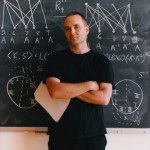
John Mighton
John Mighton
Jump
Canada
Dr. John Mighton is a mathematician, author, playwright, and the founder of JUMP Math. John completed a Ph.D. in mathematics at the University of Toronto and was awarded an NSERC fellowship for postdoctoral research in knot and graph theory. He is currently a Fellow of the Fields Institute for Research in Mathematical Sciences and has also taught mathematics at the University of Toronto. John also lectured in philosophy at McMaster University, where he received a Masters in philosophy. John almost failed first-year Calculus in university, but his love of math and his belief that everyone has great mathematical potential led him to found JUMP Math as a kitchen-table tutoring group in 1998. His national best-selling book, The Myth of Ability: Nurturing Mathematical Talent in Every Child, describes his successes with JUMP Math, and how anyone can learn and teach math.
John is also a playwright: his plays have been performed across Canada, Europe, Japan, and the United States. As a mathematician and a playwright, John believes that there are more connections between the arts and the sciences than people generally think, and that scientists and mathematicians are often led by a sense of beauty or elegance, and describe their work in artistic terms. John has given hundreds of talks and training sessions to parents and educators. In 2004, John was granted a prestigious Ashoka Fellowship as a social entrepreneur for his work in fostering numeracy and building young children’s self-confidence through JUMP Math. John has received three honorary doctorates in recognition of his lifetime achievements and was named an Officer of the Order of Canada in 2010.
About JUMP Math
Junior Undiscovered Mathematical Prodigies (JUMP), or JUMP Math, is a method of teaching mathematics that inspires measurable higher performance across the board, along with major improvements in students’ overall self-esteem and attitude towards learning. JUMP was founded on the assumption that children learn better when they feel admired and rewarded. To this end, the program method breaks down sophisticated mathematical concepts into very simple steps and fills classroom interaction with positive feedback. As the students make their way through the concepts, they are rewarded with more exercises after each success, generating a surprising amount of enthusiasm. With the support of a trained JUMP tutor, teachers create a playful, supportive environment that changes the existing negative attitude towards learning mathematics.
Quote from Who Cares?
“In science we used to study very linear systems where if you made a small change to the system, it would just change incrementally. But now people realize that in complex systems, out of a very small change, entirely new behavior can emerge. So I think people have the sense that very small actions can add up much more quickly then we previously thought. And that individuals, or small groups of individuals, can really tip a system.”
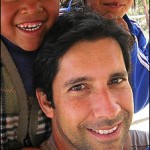
Joaquin Leguia
Joaquin Leguia
Ania
Peru
Joaquin Leguia is a social entrepreneur who has spent years raising awareness about the environment. In 1995, he created his now recognized NGO Association for Children and their Environment (ANIA) in order to train and empower children and young people to care about the environment and sustainable development. Joaquin is an Ashoka Fellow, an AVINA Social Leader, and a Member of the World Youth Spiritual Council. He was named one of the top young leaders in Latin America by Business Week magazine.
About ANIA
ANIA is redefining environmental education as a community experience, moving lessons from the school to the jungle in Peru. By setting aside areas of the forest for youth-management projects, ANIA incorporates children into the global sustainability conversation at the most crucial stage of their personal development. In a region of the world where environmental mismanagement has resulted in wasteful agricultural practices, deforestation, and biodiversity loss, ANIA leads communities in the creation of Children’s Forests–wilderness areas that both strengthen children’s knowledge and appreciation of the natural world and equip them with practical skills to sustain their conservation efforts long-term. Throughout the years, ANIA has expanded to twelve regions of the country on the coast, highlands, and jungle. ANIA’s unique model has attracted several NGOs in Portugal, India, Venezuela and Canada to seek help and advice from Joaquin to replicate his methodology in their countries. In 2012, UNESCO recognized ANIA for good practice in education for sustainable development worldwide.
Quote from Who Cares?
“When you see the indicators of a country’s development, the main indicator of how a citizen contributes to the well-being, is through the “EAP” – Economically Active Population. The economically active population recognizes the population aged 15 to 64 years of age. But I do not know of a single indicator that someone comes along and tells to a girl or a boy of 4, 8 or 12 years of age, whether urban or rural, poor or rich, never mind, that with what they are doing today they are contributing to the well-being of their country… So we have proposed to work to create a new indicator called Environmentally Active Population. And who are they? All of us, but the emphasis is on the population under 18 years and over 60 years old.”

Mary Gordon
Mary Gordon
Roots of Empathy
Canada
Mary Gordon is recognized internationally as an award-winning social entrepreneur, educator, author, child advocate and parenting expert. A former kindergarten teacher, Mary started Roots of Empathy to reduce childhood aggression by teaching students emotional literacy and fostering the development of empathy, as well as social and emotional competence. In 1996, Mary outlined the initial curriculum of Roots of Empathy and began piloting the program in Toronto. In 2000, she established the national and international organization Roots of Empathy.
Mary speaks and consults to governments, educational organizations, and public institutions. She has presented to organizations including the Nelson Mandela Children’s Foundation, the World Health Organization, the Skoll World Forum, and the United Nations, among others. Mary is the recipient of several prestigious awards recognizing her contribution to innovation in education and international social entrepreneurship, including the Manning Innovation Award, an award for being the top social enterprise in Canada. In 2009, she received the Public Education Advocacy Award from the Canadian Teachers’ Federation. In 2002, Mary was named the first female Canadian Ashoka Fellow and in 2011, she was named an Ashoka Globalizer, joining a select group of Ashoka Fellows supported in extending their message and impact to the global level. Her book, Roots of Empathy: Changing the World Child by Child, is a Canadian bestseller.
About Roots of Empathy
Roots of Empathy is a classroom-based program that reduces childhood levels of aggression by counteracting the physical, psychological, and neurological effects of parental violence and neglect. Scientists have proven that abuse during a child’s formative years affects the formation of the brain and has a lifetime impact on a child’s learning, behavior, and health. However, child development research indicates that teaching children to be compassionate and caring – and how to recognize and manage their own emotions at an early age – can mitigate the impact of violence. Roots of Empathy leverages the potential for recovery from the effects of childhood trauma and is able to reduce the frequency of aggressive, anti-social behavior. It brings a living example of the loving relationship between parent and child into the classroom. Targeted to children’s varying levels of emotional development, Roots of Empathy provides young people with strategies to effectively recognize and respond to the emotions of others. The program currently operates in 2,200 classrooms in Canada, Australia, Ireland, New Zealand, Scotland and the United States and has reached more than 325,000 children worldwide.
Quote from Who Cares?
“For little children to decide to be caring or to be helpful in the world, they need to see examples of care and helping. It’s almost as if empathy can’t be taught. But it can be caught. It’s viral.”
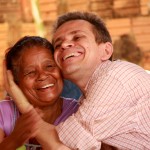
Joaquim Melo
Joaquim Melo
Banco Palmas
Brazil
Joaquim Melo had a very poor childhood in a housing project in the city of Belém. In 1978, he decided to join the parish seminary, because he dreamed of being a priest. However, six years later, as a follower of liberation theology, he felt very unsatisfied with seminary life, which involved living in luxury in a building, completely separated from the social problems of society. He learned of a Cardinal who was seeking seminary students to live in favelas and work with the poor. That was how Joaquim moved to Fortaleza, to live with two other seminary students in the “rampa do Jangurrusú”, known as the garbage dump of the city. This is where he encountered the subhuman conditions of those living as garbage pickers. After five months, at the invitation of the Cardinal, Joaquim went to live in the Conjunto Palmeira, a favela on the outskirts of the city with more than 30,000 residents and no infrastructure. Joaquim left the priesthood in 1989 to devote himself to community projects and continued his wide-scale community work, becoming involved with diverse projects in the favelas. In the late 1990s, his work took focus as he realized the important relationship between the community building he had been working on and the central role of economics and finance in social mobility.
Thus, in 1997, Joaquim created the Palmas Bank (Banco Popular para Inclusão Social), devoted to solidarity economics. Joaquim had noticed that his community, the Palmeiras (Ceará), was finally being urbanized. The former slum gave way to paved roads, commerce, water and sanitation. Then water, light and all kinds of bills suddenly began to appear and the same population that fought to improve their region was now leaving as they could not afford the new bills that were arriving at their homes. What seemed contradictory worked as an engine for his initiative: the idea was to create mechanisms to keep money in the community. Joaquim is an Ashoka fellow.
About Palmas Bank
Palmas Bank is a system, rooted in the community bank, which allows people to produce and consume within their own community. The idea is to create a system in which people can produce and consume locally, within a network of solidarity where production is carried out based on an estimate of local consumption. Neighbors offer information about the person receiving credit, giving assurances that the person is responsible and has experience in the intended field of activity.
Quote from Who Cares?
“Palmas Bank is now in 32 corners of Brazil and will multiply even more. It did not come from Harvard, USP, or FGV, nothing against these institutions or anyone else, but this came from a favela in the hidden corners of the northeast of Brazil.”
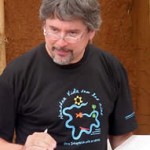
Oscar Rivas
Oscar Rivas
Sobrevivência
Brazil
Oscar Rivas was born in Asunción, Paraguay and his childhood was characterized by curiosity, involvement with art and interest in history, which grew with the development of his passion for Greek history. Growing up, Oscar was exposed to the methodology of Paulo Freire, where there are no formal classes, but rather students create their own. This approach to teaching emphasizes group study and promotes solidarity. During this period, Oscar also developed a more holistic and integrated vision of education. In 1973, Oscar decided to study architecture, because he believed that it was an area that brought together his great passions: space, art, mathematics, Greek culture, philosophy and human spirituality. He came first in the Paraguayan exam, and received a scholarship from the Brazilian Foreign Affairs Department and an invitation from the Brazilian Ministry of Education to study in any university in Brazil. Thus, at the age of 18, Oscar went to the Federal University of Rio de Janeiro and soon became involved in the student movement. Oscar always believed in a policy of citizens, of activism and political commitment, but not in parties.
In the early 1980s, Oscar returned to Paraguay. In 1986, he created the first environmental organization in Paraguay, Sobrevivencia, to carry out socio-environmental research, activities and management. The focus of this work at the time was related to habitat, especially indigenous and peasant issues. Through this work, Oscar contributed to a public recognition of citizen organizations as a cohesive force, and as having a stronger role in collective causes, in calling for public policies, and in gaining formal recognition from the government, the private sector and civil society. Through Sobrevivencia, Rivas has worked with all relevant actors in society – from the citizen level to the largest international institutions – to bringing this vision to life. Oscar is an Ashoka fellow.
About Sobrevivencia
Sobrevivência works in the conservation, restoration and sustainable management of the environment through jointly operated projects. The mission of the organization is to contribute to the empowerment of indigenous people, local communities, women’s groups and individuals to fully participate in decision-making. Sobrevivencia has introduced participatory processes for local environmental management as well as community-driven promotion of the fundamental rights surrounding the usage of water and other natural resources. This work ranges from developing and disseminating the tools for sustainable local management to maximizing citizen participation in the global decision-making processes which impact water resources. In large part, the latter strategy has taken the form of citizen opposition to large-scale dam projects funded by international financial institutions. Sobrevivencia has become a role model in Paraguay and throughout South America for its work in freshwater management rooted in the basic assumption that water is a natural public good and that, as a result, all projects that involve rivers and watersheds must account for local social, economic and environmental factors.
Quote from Who Cares?
“If we humans do not relearn the ethics of care we will very soon find ourselves walking head-on towards our own destruction”
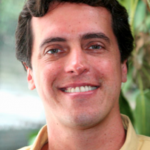
Rodrigo Baggio, Brazil
Rodrigo Baggio
Center for Digital Inclusion (CDI)
Brazil
Rodrigo Baggio had his first contact with computers at the age of 12 by his father, an information management specialist. During his adolescent years, he volunteered helping street children and mobilizing workers for a day nursery in the slums. At that time, the technology revolution was having a tremendous impact on Brazil, yet, instead of creating opportunities for all, it was creating another social divide. Rodrigo dreamed of how he might combine his desire to improve the lives of the poor with his passion for technology. In 1995, with a collection of secondhand computers and volunteer teachers, Rodrigo founded the Center for Digital Inclusion (CDI) to teach people how to use technology to improve their communities and their lives.
Led by Rodrigo, the NGO has won over 60 international awards and is now recognized by international organizations such as the UN, UNESCO, UNICEF, Ashoka Foundation, Avina Foundation, IDB, World Economic Forum, and the Clinton Global Initiative, among others. Rodrigo has been named as one of the 100 “Young Global Leaders” by the World Economic Forum; recognized by Time Magazine as one of the 50 Latin American leaders making a difference in the third millennium, and as one of 10 personalities in the world chosen as “Principal Voices” in the field of economic development by CNN, Time and Fortune Magazines, alongside Muhammad Yunus and Professor and economist Jeffrey Sachs.
About Center for Digital Inclusion
Center for Digital Inclusion uses technology to fight poverty and stimulate entrepreneurship. CDI and partners create community centers in low-income, rural, indigenous communities, hospitals, prisons, and psychiatric clinics. Because local ownership is a critical priority established at any CDI, the work of digital inclusion and citizenship can be adapted to local needs and public. Each CDI offers basic and advanced courses in computer science to a wide audience, ranging from children to seniors. The courses are free and range from Introduction to Computing (Microsoft Office) to advanced courses such as image editing and video. Since 1995, CDI has impacted over 1.5 million lives in the 13 countries in which the NGO operates.
Quote from Who Cares?
“In 1993, I had a dream. And this dream changed the course of my life. In this dream, I saw young people from poor backgrounds using technology to reflect, impact and transform the reality in which they lived.”

